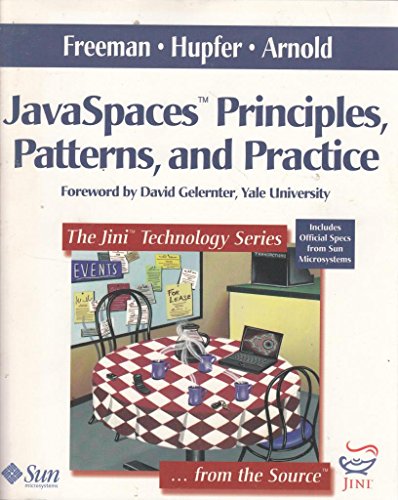JavaSpaces Principles, Patterns, and Practice (Jini Series) - Softcover

"synopsis" may belong to another edition of this title.
After a foreword by distributed computing pioneer David Gelernter, the book provides a short technology overview describing the makeup of JavaSpaces. The authors atomise their description of JavaSpaces as an overseer application that lets programs running on separate computers store and share persistent data. While the JavaSpaces API is by itself remarkably simple, this book demonstrates with deliberate fanfare the resolution of common distributed computing problems using complex design patterns.
Early sections look at the basics of reading, writing, and searching for data stored in JavaSpaces as well as presenting task and result bags as solutions to managing work done in parallel. The book also elaborates on the readers/writers problem, well known within the field of computer science and even offers a means of addressing it. The authors use code samples from a chat message server and a model of a paging system using message channels during their discussion of message passing and communication with JavaSpaces.
One section on distributed patterns presents some common solutions to doing work in parallel, including the Marketplace pattern, illustrated with an e-commerce bidding application. Further sections cover distributed events and transactions as they apply to JavaSpaces. The book closes with two excellent examples, one for a distributed messaging service and another for a brute force attack on encrypted passwords.
With the debut of JavaSpaces, business developers gain access to distributed processing previously available only to academic researchers. The JavaSpaces solution, along with JavaSpaces Principles, Patterns, and Practice, will let any Java developer audition distributed computing for the first time. --Richard Dragan
"About this title" may belong to another edition of this title.
- PublisherAddison-Wesley
- Publication date2008
- ISBN 10 0201309556
- ISBN 13 9780201309553
- BindingPaperback
- Edition number1
- Number of pages343
- Rating
Top Search Results from the AbeBooks Marketplace
JavaSpaces¿ Principles, Patterns, and Practice
Book Description Paperback. Condition: New. Seller Inventory # Abebooks39315

